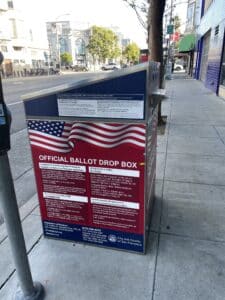Written by Christopher B. Dolan and Mari Bandoma Callado
Sandra F. from Castro Valley writes: I work at a grocery store and contracted COVID-19 in July. I have since tested negative and have been told by my medical provider that I am outside the contagious window for spreading the virus. Unfortunately, some of my symptoms have not gone away, and have been told that I have “Long COVID”. I still have fatigue, shortness of breath, lightheadedness or dizziness when I stand, headaches, loss of taste and smell, and brain fog. My job requires me to stand and walk a lot but I am having a hard time doing that for long periods of time before feeling overly tired, having shortness of breath, or getting dizzy. I am worried that I will fall or hurt myself. I would like to ask my employer for accommodation but I am not sure how. Will I get in trouble for asking for a chair or a different position while I am recovering?
Thank you Sandra for reaching out. We are sorry to hear that you are still experiencing COVID-19 symptoms. As you mentioned, for some people, the symptoms from contracting COVID-19 do not go away and some studies indicate that 10% of COVID-19 patients may become long haulers.
Is Long COVID Classified as a Disability Under the ADA or FEHA?
The Americans with Disabilities Act (ADA) and California’s Fair Employment and Housing Act (FEHA) are laws that protect California workers from disability discrimination in the workplace. The ADA has classified Long COVID as a disability “if the person’s condition or any of its symptoms is a ‘physical or mental’ impairment that ‘substantially limits’ one or more major life activities.”
Under the FEHA, Long COVID is also classified as a disability but the FEHA requires only that a mental and physical disability “limit” a major life activity (not a substantial limit, but a limit).
In other words, having Long COVID does not automatically mean that a person has a “disability” under the ADA or the FEHA. Unfortunately, there is no bright-line test for determining whether someone is disabled for purposes of the ADA or the FEHA. It is necessary to make an individualized assessment to determine whether someone’s Long COVID condition or any of their symptoms (substantially) limits a major life activity. Major life activities include but are not limited to caring for oneself, eating, performing manual tasks, walking, standing, communicating and working. You described your symptoms as something that limits your ability to work, walking and standing. It is likely that you would be considered as a person with a disability under the ADA or the FEHA, entitling you to reasonable accommodations.
What are Reasonable Accommodations?
Both the FEHA and the ADA require most California employers to give employees with disabilities “reasonable accommodations”. Employers who are covered by the ADA or the FEHA are required to provide reasonable accommodations unless the accommodation would be too difficult for your employer to provide, or doing so would endanger the health and safety of others, or change your job in a significant way.
An accommodation is reasonable when changes are made so that the employee with a disability can perform the essential functions of the job. This can be changing job duties or work schedules, providing leave for medical care, device, or technology. Essentially, these are changes that would allow employees to do their job safely and well.
How to Request Reasonable Accommodations:
The first thing you should do is to inform your employer that you have Long COVID in writing.
Note: your employer may request medical records directly related to disability and need for accommodation to determine whether you are a person with a disability.
Once you inform your employer, they must not discriminate against you and begin engaging in a good-faith interactive process to explore potential reasonable accommodations to help you perform your job effectively and safely.
Your employer can provide many different reasonable accommodations. It is very important that you maintain communications with your employer so you can explore together the accommodations that are right for you and your job. For example, you could get access to a chair so you can sit down when you feel dizzy while performing your job or you could be temporarily reassigned to a different position or be given different tasks that would allow you to sit down more frequently. You could also request a leave of absence under the Family and Medical Leave Act or the California Family Rights Act, which would entitle you to up to twelve weeks of unpaid job-protected leave.
Retaliation is Prohibited:
Retaliation is anything that changes the terms and conditions of your employment. Examples of retaliatory conduct include but are not limited to the following:
- Increased harassment or verbal abuse for opposing unlawful conduct;
- Changing schedules to an undesirable shift;
- Assigning undesirable job duties;
- Demotion or denial of promotion;
- Relocation to an undesirable location;
- Reduction in hours or pay;
- Change in compensation plans or programs;
- Denial of training or opportunity for advancement;
- Discipline such as warnings, suspension or probation for trumped-up charges; and
- Termination.
An employer must not retaliate against an employee for requesting accommodations. As such, you should not “get in trouble” for requesting accommodations for your medical condition.
If you feel that you have been discriminated against because of your disability and/or medical condition, or retaliated against for standing up for your rights and/or requesting accommodations, contact the employment attorneys at the Dolan Law Firm.
***
The COVID-19 (Coronavirus) outbreak is an ongoing, rapidly developing situation and the local, state, and federal responses are changing regularly. The Dolan Law Firm takes efforts to keep the information on this page updated, however, to guarantee up to date information it is necessary to confirm with publicly-available federal, state and local health organization guidance and government mandates.










